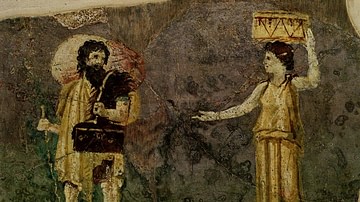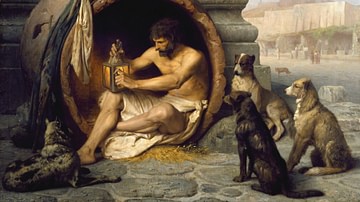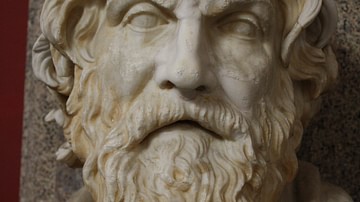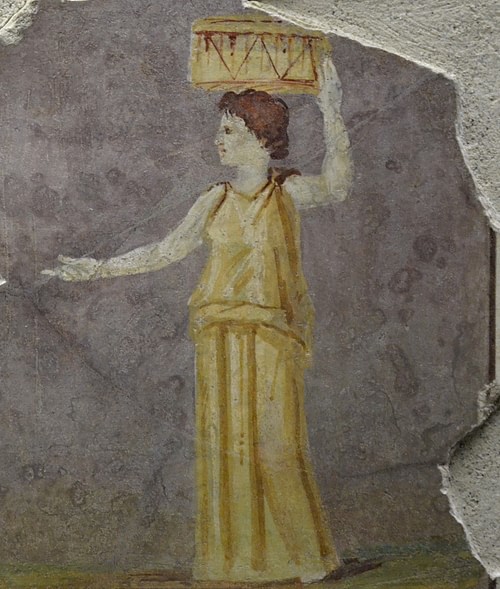
Hipparchia of Maroneia (l. c. 350-280 BCE) was a Cynic philosopher who rejected her upper-class life to live her beliefs and share her values on the streets of ancient Athens. She was the wife of the Cynic Crates of Thebes (l. c. 360-280 BCE) and greatly respected by later writers.
Information on her life comes from later works such as the Suda (10th century CE) and the Lives of the Eminent Philosophers by Diogenes Laertius (l. c. 180 - c. 240 CE) as well as fragments and references by other writers. As a woman in Athens in the 4th and 3rd centuries BCE, she would have been expected to follow the example of her mother, remain out of the public eye, and devote her time to weaving and bearing children. Hipparchia rejected this kind of life after meeting Crates. Although she had many suitors, she told her parents she would only marry him, and the two were wed shortly afterwards.
Hipparchia then lived on the streets of Athens with her husband – and later their two children – in a state of homelessness, which was in keeping with their beliefs that possessions were a trap. They owned nothing but their clothing, and both preached what they lived to others as a path to freedom and true interaction with reality. The example of Hipparchia and Crates, along with that of Socrates (l. 470/469-399 BCE), would eventually influence the philosophy of Zeno of Citium (l. c. 336 - 265 BCE) founder of Stoicism.
The Cynic School
The Cynic School was founded by Antisthenes of Athens (l. c. 445 - 365 BCE), a student of Socrates. He was one of Socrates’ older students, already established in a trade, but had devoted himself earlier to the study of philosophy with the sophists of Athens, including Gorgias (l. c. 427 BCE) who taught that what passes for knowledge in the world was only opinion. Gorgias’ central teaching was expanded by Socrates who would ask people to examine what they claimed to be truth in order to see whether it was, in fact, true or simply what they believed.
These two teachers influenced the establishment of the Cynic School by Antisthenes which advocated a rejection of socially acceptable theories, ethics, and behavior on the grounds that these were all artifice and separated one from direct apprehension of reality. Antisthenes and his followers were called "cynics" from the Greek word for "dog" (kynos) because they were thought to live like dogs. Possessions were considered a trap which came to possess their owners and so the Cynics gave away whatever they owned and lived as simply as possible, begging for food on the streets or receiving gifts from admirers.
The most famous Cynic was Diogenes of Sinope (l. c. 404-323 BCE), a student of Antisthenes, who raised the bar of Cynic behavior even higher by preaching that any act considered virtuous and natural when performed in private should not be censured when performed in public. Eating, for example, was not allowed in the public forum of the agora, but, as eating was a natural act for a human to engage in, Diogenes regularly ate there. He also freely relieved himself and masturbated in public and slept in the marketplace in an urn.
He is best known for holding a lantern or candle up to people’s faces in broad daylight claiming he was seeking an honest man. By this action, he hoped to impress on people that they were living lives of artifice, fooling themselves into thinking they were truly alive when, in fact, they were just playing parts society had written for them. Diogenes had many admirers who supplied him with food and seems to have been regarded largely as an entertaining character by the Athenians. His teachings, and example, would have a lasting effect on many who followed him, however, including one young man from an upper-class family in Thebes known as Crates.
Crates of Thebes
Crates was son and heir of a wealthy Theban family and on course to live the same sort of life his father had when he went to see a play which changed everything for him. The play was the Tragedy of Telephus in which King Telephus, a son of Heracles, is wounded by Achilles and must ask Achilles’ help in healing as only the one who inflicted the wound could close it. Disguised as a beggar, Telephus goes to Achilles’ camp and convinces him to heal the wound with the same spear that made it.
It is unknown what part of this story moved Crates so dramatically but, afterwards, he gave away all his personal possessions, left his family, and traveled to Athens to pursue the study of philosophy. It may be that he was impressed that a man dressed as a beggar was more effective at getting what he needed to survive than the same man as a king. Whatever his motivation, he attached himself to Diogenes of Sinope at Athens, listened to his lectures, and emulated his life.
Diogenes, like Antisthenes, believed that all manners and social customs were no more than lies people engaged in to mask who they really were and what they really felt, and Crates adopted this same policy. He claimed, like his mentor, that there was nothing a human naturally did in private that should be considered shameful in public, and he exemplified this belief through an episode concerning a young man named Metrocles of Maroneia who was studying philosophy under the master Theophrastus at the Lyceum (founded by Aristotle). Historian William D. Desmond relates the story as it appears in Diogenes Laertius:
Once while declaiming, Metrocles farted audibly and was so ashamed that he shut himself away from public view and thought of starving himself to death. But Crates visited him, fed him with lupin-beans, and advanced various arguments to convince him that his action [of farting] was not wrong or unnatural and had been for the best in fact. Then Crates capped his exhortation with a great fart of his own. "From that day on Metrocles started to listen to Crates' discourses and became a capable man in philosophy" (DL 6.94). Such is Diogenes Laertius' laughable deadpan conclusion, and this is the Cynic's point: everything is laughable, there is nothing serious in mortality, and one should not wrinkle one's brow with Aristotelian jargon or be ashamed of any natural functions. (28)
Metrocles had been so ashamed of embarrassing himself in public that he had actually considered suicide. Crates helped him to understand how very silly it was for him to take that event seriously on any level because every single person present in Metrocles’ audience did the same thing in private that he had done publicly and only laughed at him because they were all playing parts according to society’s arbitrary rules, not because he had done anything wrong. Metrocles embraced Crates’ vision, left Theophrastus, and became one of Crates’ most devoted followers, bringing Crates to the attention of his sister Hipparchia.
Hipparchia & Crates
It is unclear how Hipparchia would have first heard Crates speak since women were not allowed to attend philosophical lectures, even those given freely in the agora. It is probable that she first met him when he came to the house to help Metrocles with his problem or sometime afterwards. Diogenes Laertius relates the beginning of their relationship:
Hipparchia too, sister of Metrocles, was captured by [Crates’] doctrines. Both of them were born at Maroneia. She fell in love with the discourses and the life of Crates and would not pay attention to any of her suitors, their wealth, their high birth, or their beauty. But to her, Crates was everything. She used even to threaten her parents that she would make away with herself unless she were given in marriage to him. Crates therefore was implored by her parents to dissuade the girl, and did all he could, and at last, failing to persuade her, got up, took off his clothes before her face, and said, "This is the bridegroom, here are his possessions: make your choice accordingly; for you will be no helpmeet of mine unless you share my pursuits." The girl chose and, adopting the same dress, went about with her husband and lived with him in public and went out to dinners with him. (Book VI. Ch. 7, 96-97)
Antisthenes and Diogenes both rejected marriage as another of society’s traps and there seems no reason why Crates would have departed from this policy unless he was sincerely fond of Hipparchia. Once she made clear that she was only interested in living as honestly as he did, the two became almost inseparable. Hipparchia completely embraced the Cynic life, gave away all of her possessions, and lived on the streets of Athens with Crates. They are said to have had sex openly on the porches of public buildings in keeping with their belief that nothing natural done in private should be shameful in public.
They had two children, a son named Pasicles and a daughter whose name is unknown. What happened to the children is not recorded, but Pasicles is said to have had a tortoiseshell as a cradle, was bathed in cold water, and given only enough food to satisfy hunger in order to make him strong enough to endure the Cynic life. Hipparchia credited Pasicles' easy birth to her Cynic training and seems to have been praised by Crates for this.
He gently criticized her, however, when she wove him a cloak, asking whether it was woven from a genuine motive to make him the cloak or from a desire to appear to others as a dutiful wife performing an act expected of her. Hipparchia’s answer to his criticism has been lost but, based on her quick wit in answering others, it is unlikely she accepted it in silence.
Hipparchia in Public Life
Hipparchia participated fully in the life of a Cynic philosopher including debates with those of other schools. All of her correspondence and written works have been lost but, according to the Suda, she wrote a number of letters to the philosopher Theodorus the Atheist (l. c. 340 - c. 250 BCE) of the Cyrenaic School. This school had been founded by another of Socrates’ students, Aristippus of Cyrene (l. c. 435-356 BCE), who claimed that the greatest good and goal in life was the pursuit of pleasure. Aristippus was the first of Socrates’ students to establish a school which charged students to attend lectures because, as he said, when one wants money, one goes to the source of money, and only upper-class families could afford to send their sons to private schools.
It is thought that Theodorus the Atheist also charged for his teachings as he was a student of Aristippus the Younger (l. c. 380 BCE) who closely followed his grandfather’s model in philosophy. Crates and Hipparchia rejected the idea of charging people any kind of fee in exchange for knowledge, and it is thought that Hipparchia’s letters to Theodorus would have focused on this difference of opinion. The Suda, drawing on Diogenes Laertius, records personal exchanges between the two at public gatherings which suggest they were antagonists. Scholar Joyce E. Salisbury describes one of their arguments:
Hipparchia joined Crates at public dinners, shocking Greek men who expected only prostitutes to appear at these gatherings. She also "confounded" one of her critics, Theodorus, by offering arguments in a philosophic style: "If it is not wrong for Theodorus to do a particular act, then it is not wrong for Hipparchia to do it. Further, if Theodorus slaps himself, he does nothing wrong, therefore, if Hipparchia slaps Theodorus, she does nothing wrong either." The logic of the second statement, though questionable, had Theodorus stumped. At a loss as to what to do, he tried to embarrass Hipparchia by crudely pulling up her cloak. She refused to be bullied and, according to [the Suda], "did not panic like a woman". (159)
Hipparchia would not have been embarrassed at being disrobed in public because she regularly went about in near-rags and, if the reports are true, had no qualms about engaging in sexual intercourse or relieving herself in public. Theodorus, in attempting to shame her as he felt a woman should be shamed, showed how little he knew of her or her philosophy.
At this same dinner, apparently, Theodorus tried to put Hipparchia in her place by reminding her that she was a woman and women should only concern themselves with women’s work, such as weaving. According to Diogenes Laertius, Theodorus cried out, "Is this the woman who left her carding combs beside the loom?" to which Hipparchia replied, "It is I, Theodorus – but do you suppose that I have been ill-advised about myself if, instead of wasting further time upon the loom, I spent it in education?" (Book VI, ch. 7, 98).
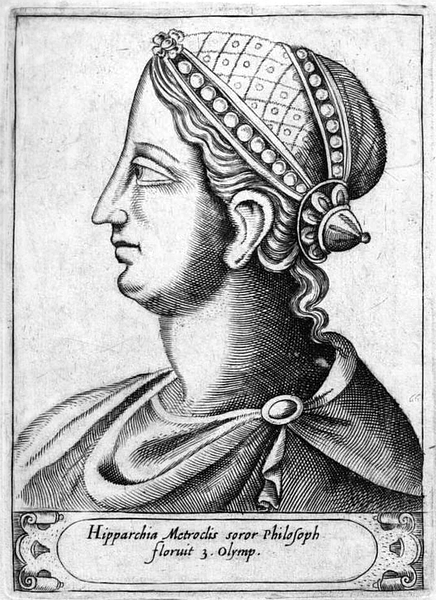
This was an especially biting response because Theodorus’ philosophical focus was on the importance of education. He believed, as did the Cyrenaic School generally, that one needed to be educated to recognize what was good and worthy of pursuing and what was bad and a waste of one’s energies. Hipparchia’s answer, therefore, went directly to his central claim, and he had no response. If he had said she was wrong in pursuing education, he would have had to admit his entire teaching was wrong; if he agreed with her, he would have had to admit women should be allowed an education. Given these two choices, Theodorus chose silence, and Hipparchia once again won the argument.
Conclusion
Crates and Hipparchia continued living their beliefs and teaching on the streets until their deaths. It is thought that Crates died first, of old age and natural causes, and Hipparchia then took over the school completely. They are both said to have died the same year, however, and so if she did become the head of the school, it would not have been for long. Hipparchia’s date of death, like the other events which make up her story, is only recorded in works written much later and may not be accurate. There is no way of knowing, in fact, whether any of the stories concerning her are historically true as noted by scholar Laura Grams:
[These tales] should be taken with the proverbial grain of salt, given that Diogenes Laertius is writing centuries later, and that his account may include 'apt' stories that are technically false, but which arose and were transmitted because they were taken to be revealing illustrations. Given the interest and controversy generated by the female Cynic, it is easy to imagine stories [like her refusal to marry anyone but Crates] being told about her. In any event, we know that Hipparchia chose to marry Crates and share his philosophical pursuits. (1)
Based on later writers, as noted, she wrote a number of letters and philosophical works which did not survive. Later admirers, however, created works attributed to her or to Crates, the most famous being The Cynic Epistles (1st century CE) which present themselves as letters from Crates to Hipparchia discussing Cynicism and how to live it. The story of Crates’ criticism of the cloak comes from these letters but is thought to be modeled on an actual story (as many of the events in the letters could be) passed down by adherents of the Cynic School.
The only piece of Hipparchia’s actual work which may have survived is an epigram preserved by the Roman poet Antipater of Sidon (l. 2nd century CE) which is thought to have been written for her tomb:
I, Hipparchia, have not followed the habits of the female sex
But with manly courage, the strong dogs – the Cynics.
I have not wanted the jewel on the cloak nor bindings for my feet
Nor head ties scented with ointment; rather a stick, bare feet, and
Whatever covering clings to my limbs, and hard ground instead of a bed. (Salisbury, 159)
This epigram is also given as concluding with the line "My name shall be greater than Atalanta" - an allusion to the great mythical huntress and runner - "for wisdom outshines mountain running". Whether the epigram is Hipparchia’s original work is not as important as what it says about how she lived: as a woman, like Atalanta, who remained true to herself and lived the life she chose, not the one others tried to choose for her.



